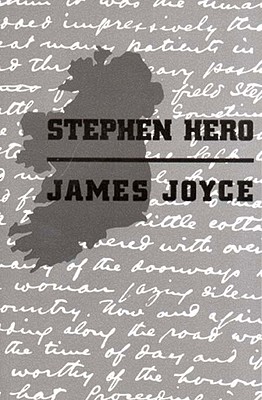APS TOGETHER
Day 1
Stephen Hero by James JoyceOpening, pp. 23-31
January 12, 2022 by Belinda McKeon
Though of course it’s the consequence of a large chunk of the manuscript being lost, still there’s something energizing, isn’t there, about being plunged into the narrative mid-sentence; in the middle of a sentence, indeed, which doesn’t entirely make sense, no matter how we build out its full version: anyone spoke to him mingled a too polite disbelief with its expectancy. What are we being told, here, of Stephen Daedalus, whom we meet in this unfinished novel in his earliest form? Even if this is not an opening sentence, but the fragment which has wound up standing as the opening sentence in this New Directions edition of the book, it’s interesting to read it as an opening sentence, with the kind of foreshadowing, tonal hinting, mood-setting that an opening sentence sometimes performs. What do you see in those twelve words? I see youthful self-consciousness, hyper-attunement, a narcissistic state of intense alertness to the possible meanings, the possible subtexts and the laborious efforts of every moment of speech, of encounter, of demeanor. Is it that Stephen’s own expression or tone, when spoken to by anyone, mingles that “too polite disbelief” with expectancy? Or is it that the way in which anyone speaks to him mingles these things? Expectancy of what? Of the disbelief itself? And what is it, anyway, for disbelief to be polite, let alone “too polite”? I’m exhausted just thinking about it. Slow your roll, Stephen, take a breath…but no. Because if Stephen Daedalus had ever slowed his roll we wouldn’t have Stephen Hero, and we wouldn’t have Portrait, and we wouldn’t have Ulysses. Strap in. Here we go, into the Dublin that, on his twenty-second birthday, in 1904, James Joyce got down to the task of imagining in fiction. A hyper-attentive fragment about how to sound, or about how the speech of others appears to sound, is maybe the best possible way to begin.
Look at the skill with which Stephen disarms the lurking bursar, the priest who spends his mornings in the university entrance hall, ready to pounce on any student who shows up more than a few minutes after the start of lectures. On this given morning, even though he arrives behind Moloney, the student who gets a bollocking from the bursar for being eight minutes late, Stephen is in fact early by his own standards; usually, he’s so late that the bursar has given up and left the hall for the morning. It’s a sliver of a scene, but one in which we see something fundamental about Stephen; he knows how to handle these priests. Watch him take his time, hanging up his coat, keeping his back to the bursar’s accusing stare, then turning his head towards him quietly and landing the line which he knows will get him off the hook: “Fine morning, sir.” It’s a challenge, a call to dignity, an invitation to focus on the finer things, and it works: the bursar backs off, agrees about the morning, wanders off onto neutral ground, conversationally, and Stephen goes unchided. And wrapped up in all of this, crucially, is Stephen’s demonstration and reminder—to us, to the bursar, to himself—of what he is not: not, like that apologetic student before him on the stone steps, “fat…hard-working…timorous…with a bread and jam complexion." He doesn’t blush, he doesn’t break a sweat, he doesn’t bow down to the clergy. He’s not fat. There’s a cruelty in this demarcation, in this holding-apart of himself, and we’ll see it again, in a moment, when he meets with another student, Madden, and notes the “brogue” of his pronunciation (Stephen himself, as Irish, would not escape the brogue, but clearly he thinks of himself as doing so) and the “peasant strength of his jaws'' as he fills out a docket for a book at the library. Peasant jaws at the desk of the National Library; lord have mercy! But Stephen doesn’t. And on we go.
I have to say that as a college lecturer, I wouldn’t love to have Stephen Daedalus in one of my English classes; I’d praise to the skies that description of Father Butt, the college dean, as a man whose “vocal ligaments, like his garb, seemed to be coated with chalk." But the Daedalusian Theory of Verse, and those long weekly essays, “remarkable,” in the account of their author, “for a certain crude originality of expression”; I think I’d be hoping for Stephen to keep up the practice of arriving in class three quarters of an hour late. Still, though, what we are seeing here is the emergence of Stephen’s intellect, his eye for detail, the set of rules which will structure and elevate his transformation, as an artist, of the world around him. The final scene in this opening section, in which he recounts his daily walk across the city, from Amiens Street station to the college, is on fire with the ambition, the arrogance, the cruelty, and above all the hyper-attunement of this young man, seeing his city and naming it, striving as he passes every face and every monument “to pierce to the motive centre of its ugliness.” See him, striding with “deliberate, unflagging step” across Dublin, repeating to himself until they become “wonderful vocables” the words and phrases that come to him, fighting “with every energy of body and soul” against the temptation to be “obvious." All the sad young literary men? He’s left them behind on Earlsfort Terrace.
